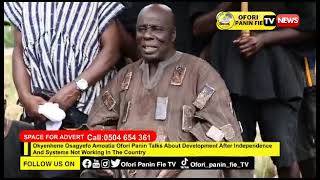In a scathing critique of the current state of Ghana's economy, Okyenhene, the respected King of the Akyem Abuakwa traditional area, has expressed his frustration and concern over the apparent failures of the country's economic systems. In a rare display of public discontent, the Okyenhene has raised pertinent questions about the efficacy of government policies and the impact they are having on the lives of Ghanaians.
The Okyenhene, known for his wisdom and measured approach to matters of national interest, voiced his sentiments during a gathering of prominent leaders and policymakers. His criticism came as a surprise to many, given his position as a traditional ruler and the customary diplomatic language often associated with such figures.
Addressing the gathering, the Okyenhene did not mince his words, stating, "The systems are not working. The economic challenges faced by our people are alarming, and it is high time the government takes decisive action to address them."
Ghana, once considered one of the most promising economies in Africa, has been grappling with numerous economic challenges in recent years. The nation's growth rate, which was once among the highest on the continent, has seen a significant slowdown. High inflation, soaring public debt, and persistent fiscal deficits have added to the strain on the economy, affecting businesses and households alike.
One of the major concerns highlighted by the Okyenhene is the rising cost of living in Ghana. Inflationary pressures have led to a steady increase in the prices of essential goods and services, putting immense strain on ordinary citizens. The Okyenhene stressed that it is the common people who bear the brunt of these economic hardships, and urgent action is needed to alleviate their suffering.
The agricultural sector, which forms the backbone of Ghana's economy and employs a significant portion of the population, has also faced challenges. Erratic weather patterns, inadequate access to modern farming technologies, and market inefficiencies have hindered the sector's growth and the prosperity of farmers. The Okyenhene emphasised the need for targeted interventions to boost agricultural productivity and support rural communities.
Moreover, Ghana's industrialization drive has not yielded the desired outcomes. Despite various initiatives and investments, the country's manufacturing sector continues to struggle with issues like high production costs, inadequate infrastructure, and competition from cheaper imports. The Okyenhene urged the government to reevaluate its industrial policies and create an enabling environment for local industries to flourish.
The state of Ghana's currency, the cedi, has also been a cause for concern. Frequent fluctuations and depreciation against major currencies have added to the uncertainty for businesses and investors. The Okyenhene called for measures to stabilise the cedi and restore confidence in the country's financial system.
Beyond economic concerns, the Okyenhene expressed worries about the impact of these challenges on the nation's youth. Ghana's young population represents a significant demographic segment with enormous potential for growth and innovation. However, unemployment and underemployment rates have remained stubbornly high, leading to a sense of disillusionment among the youth. The Okyenhene stressed that empowering the youth through education, skills training, and job creation is essential to securing a prosperous future for Ghana.
In response to Okyenhene's remarks, the government has acknowledged the severity of the economic situation and vowed to take appropriate actions. The Minister of Finance assured the public that steps are being taken to address the pressing issues and that a comprehensive economic reform plan is in the works.
While the government's promises are welcomed, many Ghanaians are cautiously hopeful, given the longstanding nature of the economic challenges and the need for tangible results. The Okyenhene's bold stance has ignited a national conversation about the state of the economy and the urgency for decisive action.
In conclusion, the Okyenhene's vocal condemnation of the state of Ghana's economy has brought to the forefront the hardships faced by ordinary citizens and the need for meaningful reforms. His rare display of public frustration reflects the growing concern among Ghanaians over the apparent failures of economic systems to improve their lives. As the nation awaits concrete actions from the government, it is clear that addressing these challenges requires a coordinated effort, innovative policies, and a commitment to building a more prosperous and equitable Ghana for all.




No comments yet
Be the first to share your thoughts!